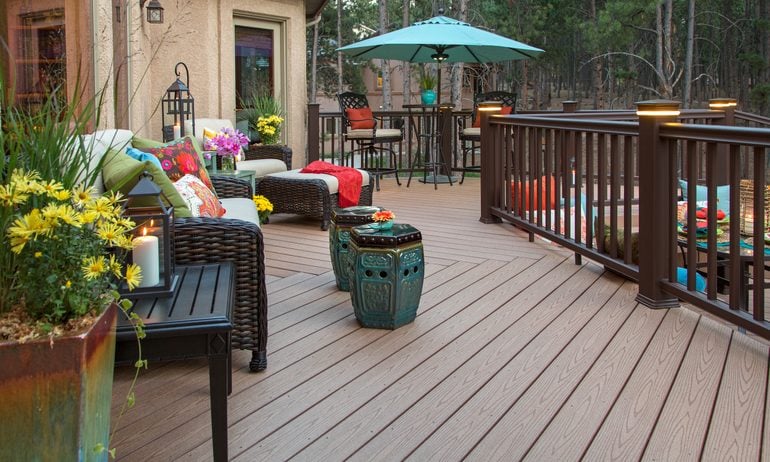The Cost to Build a Deck in 2025
A typical deck costs between $9,000 and $20,000, with the national average at $14,000.

Some or all of the mortgage lenders featured on our site are advertising partners of NerdWallet, but this does not influence our evaluations, lender star ratings or the order in which lenders are listed on the page. Our opinions are our own. Here is a list of our partners.
Table of Contents
Table of Contents
The national average cost for building a deck is $8,246, with an average range of $4,341 to $12,586, according to home project hiring platform Angi.
The size of your planned deck, the materials you plan to use and who builds it will all affect how much you ultimately spend. Knowing deck costs in advance — as well as ways to finance its construction — can help you build a deck without destroying your budget.
Deck cost by size
The average cost to add a professionally built deck to your home is between $30 and $60 per square foot, according to Angi. Size is one of the most significant price factors for a deck, with larger decks costing more in materials and labor.
For example:
A 12x12 deck is likely to cost between $5,760 and $8,640.
A 14x20 deck is likely to cost between $11,200 and $16,800.
A 20x20 deck is likely to cost between $16,000 and $24,000.
Deck cost by material
In addition to size, the material type has a significant influence on the overall price of a new deck.
Wood decks
Wood is the most popular deck material. Wood decks typically cost between $3 and $20 per square foot, excluding labor expenses.
Better Homes and Gardens recommends washing and restaining wood decks every two to three years. Pressure-treated wood is generally the most affordable lumber option, but premium varieties like redwood and composite decking (made of recycled plastics and wood byproducts) can be more expensive.
Wood type | Cost per square foot (material only) |
|---|---|
Pressure-treated wood | $3 to $8. |
Premium natural wood | $4 to $20. |
Composite wood | $5 to $20. |
Vinyl or PVC
Vinyl or polyvinyl chloride (PVC) decks typically cost between $5 and $13 per square foot, excluding labor. Homeowners may choose this option because vinyl doesn’t stain, rot or face the risk of insect damage, because it is entirely synthetic.
Metal
Metal decks typically cost between $6 and $20 per square foot, excluding labor. Metal decks are most commonly made of aluminum or steel, and like vinyl decks, don’t rot or get damaged by insects. Metal is also more fire-resistant than wood or plastic.
However, the metal can get hot in the sun (which could be especially dangerous for households with children or dogs) and may easily dent.
Labor costs
Material expenses are only half of the total cost of having a deck installed. According to Angi, homeowners can expect to spend between $15 and $35 per square foot for professional labor.
These costs can be inflated during peak season, when contractors are busiest. To get the best deal, consider putting off the project until off-peak season, when demand slows. As always, shop around and get multiple professional estimates before making your selection.
According to the National Association of Realtors 2023 Remodeling Impact Report, homeowners recover 89% of the cost of a new wood deck via added home value. On a scale from one to 10, homeowners who installed a new wood deck gave it a “joy score” of 9.8.
Can I get financing for a home repair or improvement?
Your contractor may offer some financing options (either through a partner or a payment plan), but there are other — and maybe better — financing options available.
Which financing option is best for me?
The best financing option for you will depend on how much money you need, when you need the money, what project you’re doing and how long you need to pay the money back. If it’s something that’ll add value to your home, a HELOC or home equity loan may be your best option because the value of your house could increase by more than the amount of the loan.
On the flip side, if it’s a less expensive repair, a credit card is probably your best option if you want to pay no interest or earn rewards. Personal loans can apply to both small and large repairs or renovations, and they may make sense if you don’t have much equity in your home.
Some home improvement contractors offer their own financing options. Before taking this option, shop around and see how their offer compares with other loans.
Regardless of what you choose, make sure you compare interest rates, terms and fees with any financing options you’re considering. This will ensure you get the best deal.




